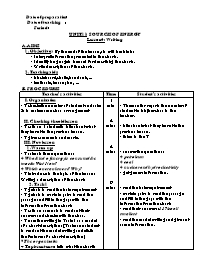Bài soạn môn học Tiếng Anh lớp 11 - Unit 11: Sources of energy - Lesson 4: Writing

A. AIMS
1. Objectives : By the end of the lesson, sts will be able to:
- Interpret information presented in the charts.
- Identify language to be used for describing the charts.
- Write descriptions of the charts.
2. Teaching aids:
- blackboard, chalk, handouts, .
- textbook, lesson plan, .
B. PROCEDURES
Bạn đang xem tài liệu "Bài soạn môn học Tiếng Anh lớp 11 - Unit 11: Sources of energy - Lesson 4: Writing", để tải tài liệu gốc về máy bạn click vào nút DOWNLOAD ở trên
Date of preparation: Date of teaching : Period: Unit 11: sources of energy Lesson 4: Writing A. Aims 1. Objectives : By the end of the lesson, sts will be able to: - Interpret information presented in the charts. - Identify language to be used for describing the charts. - Write descriptions of the charts. 2. Teaching aids: - blackboard, chalk, handouts, ... - textbook, lesson plan, ... B. Procedures Teacher’s activities Time Student’s activities I. Organization - T checks the number of students and asks Ss to make some class arrangement. II. Checking the old lesson - T calls on 1 student to talk about what they learnt in the previous lesson. - T gives comments and mark. III. New lesson 1. Warm- up: - T asks sts these questions: + What kind of energy is consumed the most in Viet Nam? + Which one ranks next? Why? - T introduces to the topic of the lesson: Writing a description of the chart. 2. Task 1 - T gets sts to read the task requirements - T gets sts to work in pairs to read the passage and fill in the gaps with the information from the chart. - T calls on some sts to read out their answers and checks with the class. - T uses the writing in Task 1 as a model of a chart description: (T asks one student to read out the model writing and elicits the features of a chart description) * The organization + Topic sentence: tells what the chart is about- time, location........ + Supporting sentences: a sentence that sums up the general trend and some other sentences describe the chart in details. + Concluding sentence: summarises the main points. * Language use: present simple tense or past simple tense. 3. Task 2 + 3 - T tells sts that before they describe a chart, they need to spend time analyzing it and organizing the information in the most logical order. Eg: Sts must understand the topic, general trend of the chart........ - T tells sts to study the chart again and continue their description of the trends in energy consumption in the year 2005. - T goes around to check and offer help. - T asks sts to work in pairs and correct each other’s writing. - T gets sts to combine their writing in task 1 and task 2 to make up a complete writing about the trends in energy consumption in Highland in the year 2000 and 2005. 5. Feedback on sts’ writing - T chooses one description and reads it to the class. - T elicits corrective feedback from the class and gives final comments afterwards. T draw sts’ attention to the organization of description and the language use, especially the verb tenses and expressions of changes. IV. Consolidation - T summarises the main points of the lesson. V. Homework - T asks sts to write a description of a table they see in the newspaper (any table). VI. Feedback 1. Good points 2. Weak points 1 min 4 mins 4 mins 9 mins 18 mins 6 mins 2 mins 1 min - The monitor reports the number of students in his/her class to the teacher. - talk about what they learnt in the previous lesson. - listen to the T - answer the questions: + petroleum + coal + nuclear and hydroelectricity - get general information. - read the task requirements - work in pairs to read the passage and fill in the gaps with the information from the chart. - read their answers: 117/ coal/ smallest. - read the model writing and give out some information. - note down - listen carefully and copy down. - study the chart again and continue their description of the trends in energy consumption in the year 2005. - ask for help if necessary. - correct each other’s writing. - combine their writing to find the rapidly increasing energy consumption in Highland. - give corrective feedback and listen carefully. - take note - listen and note down - take note and do at home
Tài liệu đính kèm:
 Writing 11.doc
Writing 11.doc





